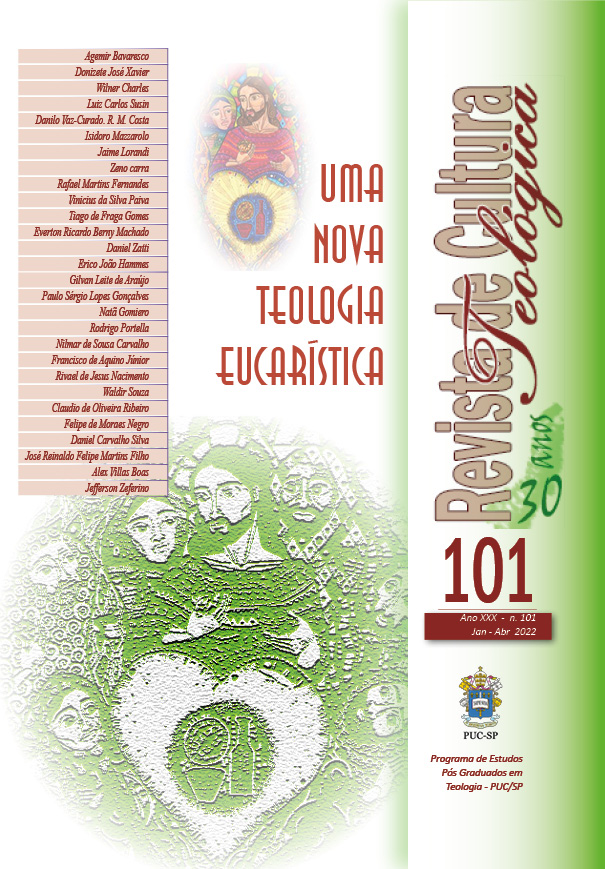Do diálogo ao encontro
a teologia das religiões de Andrés Torres Queiruga e o princípio pluralista
DOI :
https://doi.org/10.23925/rct.i101.54525Mots-clés :
Diálogo inter-religioso, religiões, princípio pluralista, Torres Queiruga.Résumé
O texto apresenta resultados de pesquisa sobre as possibilidades de aproximação entre a teologia das religiões de Andrés Torres Queiruga e o princípio pluralista. Metodologicamente, a análise e a apresentação dos resultados estão estruturados nos seguintes passos: (i) identificação das referidas aproximações, sobretudo a perspectiva de se superarem modelos tradicionais de avaliação do dado salvífico, como o incluvista e o pluralista, recorrendo às zonas fronteiriças deles; (ii) distinção entre as noções de diálogo, que pode implicar conotação de uma verdade que já se possui plenamente e que vai ser ‘negociada’ com o outro, e a de encontro, que sugere mais intensamente um sair de si, unindo-se ao outro para ir em busca daquilo que está no horizonte de ambos; (iii) explicitação da visão de que é na partilha solidária e respeitosa do Mistério que as religiões contribuirão para a genuína percepção de revelação e o consequente relacionamento sadio entre elas; (iv) descrição das categorias de universalismo assimétrico, teocentrismo jesuânico e inreligionação para a tarefa de interpretação da revelação; e (v) destaque para a noção de que as autênticas identidades são forjadas nos encontros, no respeito e na relação de alteridade entre diferentes, como realça o princípio pluralista.Références
BHABHA, Homi K. O Local da Cultura. Belo Horizonte: Editora UFMG, 2001.
DUPUIS, Jacques. Rumo a uma teologia cristã do pluralismo religioso. São Paulo: Paulinas, 1999.
GEFFRÉ, Claude. Crer e interpretar: a virada hermenêutica da teologia. São Paulo: Vozes, 2004.
GONÇALVES, Paulo Sérgio Lopes. Identidade e Sabedoria: a reflexão teológica como Veritatis Gaudium. Revista de Cultura Teológica, São Paulo, PUC SP, v. 28, n. 95, p. 87-113, jan./abr. 2020.
MIGNOLO, Walter. Histórias locais-Projetos globais: colonialidade, saberes subalternos e pensamento liminar. Belo Horizonte: Ed. UFMG, 2003.
NOBRE, José Aguiar. Ecumenismo e o diálogo das religiões em Andrés Torres Queiruga. Atualidade Teológica, Rio de Janeiro, PUC Rio, v. 20, n. 53, p. 339-354, maio/ago. 2016.
PUI-LAN, Kwok. Globalização, gênero e construção da paz: o futuro do diálogo interfé. São Paulo: Paulus, 2015.
RIBEIRO, Claudio de Oliveira. Religião, democracia e direitos humanos: presença pública inter-religiosa no fortalecimento da democracia e na defesa dos direitos humanos no Brasil. São Paulo: Reflexão, 2016.
RIBEIRO, Claudio de Oliveira. O princípio pluralista. São Paulo: Loyola, 2020.
SANTOS, Boaventura de Souza. A gramática do tempo: para uma nova cultura política. São Paulo: Cortez, 2010.
TORRES QUEIRUGA, Andrés. Repensar a Cristologia: sondagens para um novo paradigma. São Paulo: Paulinas, 1998.
TORRES QUEIRUGA, Andrés. Recuperar a Salvação: por uma interpretação libertadora da experiência cristã. São Paulo: Paulus, 1999.
TORRES QUEIRUGA, Andrés. Fim do Cristianismo pré-moderno: desafios para um novo horizonte. São Paulo: Paulus, 2003.
TORRES QUEIRUGA, Andrés. Repensar a Ressurreição: a diferença cristã na continuidade das religiões e da cultura. São Paulo: Paulinas, 2004.
TORRES QUEIRUGA, Andrés. Autocompreensão cristã: diálogo das religiões. São Paulo: Paulinas, 2007.
TORRES QUEIRUGA, Andrés. Repensar a Revelação: revelação divina na realização humana. São Paulo: Paulinas, 2010.
TORRES QUEIRUGA, Andrés. Repensar o Mal: da ponerologia à teodiceia. São Paulo: Paulinas, 2011.
Téléchargements
Publié-e
Comment citer
Numéro
Rubrique
Licence
© Revista de Cultura Teológica 2022

Cette œuvre est sous licence Creative Commons Attribution - Pas d'Utilisation Commerciale - Pas de Modification 4.0 International.
Os autores concedem à revista todos os direitos autorais referentes aos trabalhos publicados. Os conceitos emitidos em artigos assinados são de absoluta e exclusiva responsabilidade de seus autores.

